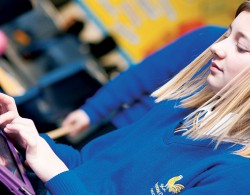Over the past few years, many a teacher has stared into a Nintendo DS-strewn homeroom, and pondered a fearful question. Games! How can school, how can algebra, Latin, AQA Leisure & Tourism module 34, ever compete with Super Wario World 3D?
Among the more common responses has been the discovery that although one may be unable to beat the gaming menace, one can very much join it. A number of services have sprung up to 'gamify' learning at all for all manner of subjects and ages. To review these curious allies – those online services that promise to tap the insatiable appetite of your charges for Call of Duty and Bejeweled, and channel this energy towards German verb endings – it might be helpful to imagine them somehow squeezed and slanted onto a sort of KS1 number line.

An inch or so to the right, and we're at Khan Academy, the wonderfully free and Google-sponsored guide to absolutely everything, but mostly maths. In fact, there's rather a lot of maths at this end of the chart, for reasons that I couldn't possibly begin to speculate upon. To learn the Chain Rule – watch a video of Salman Khan explaining it, then it's down to practice problems. Practice problems that earn you 'energy'! And achievement badges! For a student who's already motivated to learn, it really is an almost perfect solution to keep them at it, though for one who isn't, heavier artillery is perhaps needed.
We slide along a little bit further, then, and reach the likes of Zondle. Ski down a slope! Fight a bear! Then stop that right now and conjugate those French verbs. Je suis? You get to play for ten more seconds. Je Suisse? No more skiing for you. Iamlearning tweaks this by granting sustained bursts of gaming at the end of sustained periods of grind, and seem to get pretty good results – I'm sure it works, but a slightly odd effect of this is that is presents the work as repulsive, even to students who'd otherwise not mind it. It's explicitly setting up what you want your students to learn as something in active opposition to them having fun; a sort of Faustian pact to create bright, motivated learners who'll later drop out to chew gum and read about Jordan.
More than halfway along now, and here's MangaHigh and bActive and PlayBrighter. Now the questions are embedded into the games a little more, and the flow rather more maintained. On Mangahigh, which is free and rather good, this is achieved by creating the games around the skills in question, so that the wonderfully titled “Ice Ice Maybe” teaches students estimation through inexact placement of an iceberg. PlayBrighter, also free, isn't subject-specific in the same way, so instead the questions get integrated into a wider narrative – knowing the colour of anhydrous copper sulphate, or which verbs take avoir, becomes laying down the drum track of your debut single, or commencing a hostile takeover of the Manhattan skyline. This spot on the line also tends to be where graphics rise above the level of active student contempt, which is a considerable bonus for the sort of teacher invested in appearing young, hip and easily manipulated.
Further still, and we come to the boundless spaces beyond the line; the idea here is that if one can create a student in whom knowledge of GCSE History has become the veritable Pokémon-card of his desire, one can more or less leave him to teach himself. Classroom uses of games like Spacechem for ICT and Fate of the World for Geography fit here, and although it's a brave teacher who's able to jettison AfL requirements so completely, the rewards when it works seem worth the inevitable stern conversations with higher-ups. At the very far end, we might even put something like Lego, who are increasingly active in the educational sphere, and whose Piaget-inspired message seems to centre on, well, playing with Lego.
Somewhere along this line probably lurks the right resource for your students. Fun and learning are too often considered enemies, when the relationship is really more like awkward strangers who met once at a wedding; the world of educational gaming might seem daunting at first, but with the right tools, the eyes that shine so bright for Mario, might also shine for you.
About the author
Greg Pallis is the 'classroom-tested geek' behind playbrighter (playbrighter.com); an online resource, which is currently free to use, established with the aim of providing curriculum focused, endlessly adaptable games that 11-16 year olds might actually want to play.











“This spot on the line also tends to be where graphics rise above the level of active student contempt...”